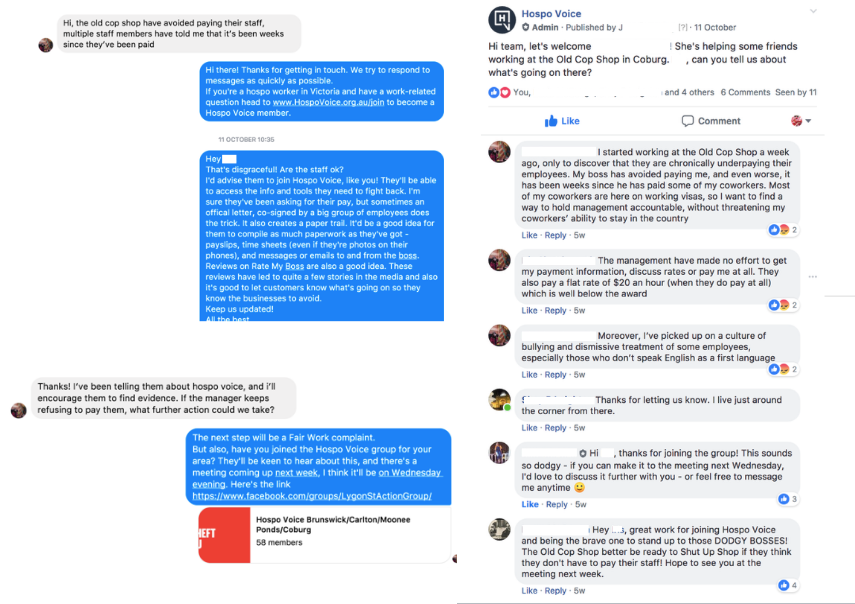We spoke to Tim Petterson, the communications and campaigns director at United Voice, who has been intimately involved with the Hospo Voice Project.
Tim gave us insider knowledge regarding this fascinating campaign. Read on to know how they went about it and successfully used digital tools to engage workers and mobilize on the ground actions. If you want to listen to the conversation, scroll down the end of the post.
The Stirrings of Hospo Voice
It was a sunny day in Melbourne, Victoria when Martha (name changed) walked into the popular burger joint where she’d been working as a waitress. A few hours later, she’d been fired by her boss, simply because she’d requested proper compensation. Martha was absolutely furious at this—she’d worked diligently for long hours because she badly needed the money. Raging at the humiliation and injustice, Martha reached out to her union United Voice—one of the largest trade unions in Australia which helps workers much like herself, to fight for fair treatment at work.
She also shared her story online on social media platforms, and there was a petition to get her reinstated.
This simple action resulted in an astonishing chain reaction. Not only was her story widely circulated on these platforms with people across the country empathizing with her, but other workers also began sharing their own experiences of having been mistreated at various bars, restaurants, and cafes all over Melbourne. And within a day, 25,000 people had signed her petition.
This sparked one of the biggest changes in the hospitality industry that Victoria has ever seen. It gave rise to Hospo Voice, Australia’s first digital union which exclusively fights for the rights of hospitality workers. And guess what? They’re winning big time.
“We were quite surprised by the level of support someone can get online, and the anger that people felt towards the burger chain for how she was mistreated. So, we kind of knew that it is possible to build power online behind hospitality workers and that they aren’t as powerless as we’d previously thought. This inspired us to build something real and sustainable that doesn’t necessarily look like a traditional union.”
Problems and Challenges
The hospitality industry has traditionally been huge in Melbourne. There are people working as waiters, bartenders, and in the kitchens who come from all parts of the world and speak different languages.
Since a majority of them fall in the age bracket of under 30, it has been easier for managers to exploit them because they’re more vulnerable and less likely to be aware of their rights.
Before Hospo Voice emerged, a lot of these workers felt they had little capacity to speak out against endemic issues like wage theft and sexual harassment by managers who knew they could get away with it.
Government websites and employers still haven’t made it easy for workers to know how much they should be getting paid, with lax laws around wage theft. There was also no platform for workers to air their grievances or get advice about the actions they should be taking to defend themselves.
The main challenge Hospo Voice faced was bringing together workers of an industry that been fragmented and disorganized right from the very beginning and to empower them to come as one and fight back against a system that undermines them.
While field organizers traditionally drove from one workplace to another to manage activities, this wasn’t a feasible option for the hospitality sector.
“With hospitality, that kind of plan doesn’t really work because there’s just pretty much a galaxy of small workplaces and such an endless turnover of workers”
So what was the obvious step that Hospo Voice had to take? That’s right—going digital.
Digital tools for an Online to Offline Path
While Hospo Voice relies mainly on digital, these tools are ultimately a means to mobilize people offline. In other words, the union focuses on building power online through digital tools and then uses this momentum to turn people out for various offline events, be it a rally, a social event, or a meeting.
“We plug them into a conversation and put them on a pathway that leads them towards getting involved in this movement of hospitality workers.”
#1 Custom Digital Tools which Integrate with NationBuilder
Hospo Voice has built a set of tools largely on the NationBuilder platform which acts as the starting point in connecting with workers and potential volunteers and activists.
- Fair Plate: Using this tool, hospitality workers can rate their bosses and review their workplace by sharing their experiences so that others get an inside view before they work there.
- Record My Hours: Workers can record their working hours and the breaks they’ve taken to confirm if their pay corresponds with the hours they’ve put in.
- Pay Checker: This tool lets workers find out the right pay rate for the work they do.
- Harassment Diary: People can record incidents where they’ve been bullied and harassed so that they can take action against unlawful behavior.
When a person signs up on Hospo Voice to use these tools or takes an action such as reviewing an employer, a wealth of data gets created which is used to nurture each worker through conversations and offline activities.
“NationBuilder is probably the source of truth for us. It works for us combined with other tools like CallHub and the other platforms that we use. This is where we keep track of all of our members and supporters.”
Peer to Peer Texting and Email to Connect with People
#2 Peer to Peer Texting
The union then contacts its activists remotely (usually via Zoom) every week and gives them a list of contacts whom they’re supposed to talk to.
These activists then use peer-to-peer texting to contact the workers who have been assigned to them. Their aim here is to build relationships with workers. They engage in one-on-one conversations with them, trying to find out their workplace issues, the bad experiences they’ve had with their bosses, and what they’d like to change about their industry.
Through these peer to peer conversations, these activists inform them of the steps they can take to protect their rights. They then try to get workers to sign up to be a union member and be more active in their local community by joining their local Facebook groups.
#3 Autopilot
While activists are conversing with workers through p2p, Hospo Voice sends emails simultaneously through Autopilot. These two channels act as mutually reinforcing media to convince people to actually join the union and stand up for their rights.
Autopilot acts as a nurturing tool wherein emails are sent out to workers and members based on the actions they’ve taken, such as if they sign a reviewing an employer. These emails detail the importance of the union, the change they’re creating, and their achievements so far.
Facebook Groups and On-the-Ground Action
#4 Primary feature name
Through p2p texts, workers are moved into Hospo Voice’s Facebook groups. They currently have 6 of these local groups based in different areas in Melbourne. These groups are associated with their local action groups where members come together to plan how to fight wage theft in their local community, support each other, and get more Hospo workers active in their area.
These members are encouraged by activists to take part in offline activities in their local community such as rallies, poster runs, snap protests, demonstrations and social events. These events are created on Facebook where people can confirm their attendance and interest in taking an active part in the movement.


#5 On the Ground Action
Union members reach out to people who’ve indicated their interest in Hospo Voice to remind them to actually attend these events. The communication that takes place here is done through a various mix of tools right from texting to emails and phone calls.
“We are speaking to people through a range of different platforms, and SMS is certainly a big part of that, and whether it be through SMS blasts, peer to peer texting campaigns and conversations through Facebook messenger, email, phone, face to face. It’s a completely comprehensive approach to try and talk to people however we possibly can”
Using a multi-channel approach ensures that maximum people take part in these events. This puts them on the journey of not just being a union member of Hospo Voice, but an active member working to change the industry.
On-the-ground action, protests, and relentless media and online campaigning against bad employers is crucial to the Hospo Voice movement since it spreads awareness around the issue and the impact of the campaign on people’s lives. This makes people more eager to join such a movement.
“The bigger the campaign machine, the more noise, color, movement, campaigning, protest and action that takes place across the city and state, the more people want to be involved in the movement.”
Impact
By going digital, Hospo Voice has been instrumental in catalyzing the transformation of an industry in Australia that has been notorious for mistreating its employees, and even worse, casually getting away with. They’ve given regular hospitality workers like Martha a space to voice their concerns, talk to people facing similar issues at the grassroots level, get advice on the steps they can take to protect her rights, and finally, be an active part of a movement to revamp the industry.
1. More than 500 signups
Since it started six months ago, Hospo Voice has been successful in signing up more than 500 union members and has helped thousands more through their online resources.
2. 2500+ reviews made so far
The Fair Plate tool has 2500+ reviews so far submitted by workers all across Melbourne. This tool is helping shape perceptions of bars, restaurants and cafes among current and potential staff as well as customers. People are now able to see which venue pays its workers well and treats them with respect and on the basis of this, decide whether they’d want to visit a place or not. Since employers don’t want to lose any customers, there is now more pressure on them to ensure workers are treated well. Hospo Voice has also begun to accredit venues that pay staff properly—about ten venues have received Fair Plate Accreditation so far.
3. Successful in getting stories out in the media
They’ve been triumphant in organizing workers through their digital tools and harnessing the collective power of the masses. This has led to them getting important stories out in the media (through their journalistic ties) and using these resonating stories to involve more people in their movement by engaging them in peer-to-peer conversations.
4. Laws are set to become much stricter
Hospo Voice has managed to successfully campaign for the Victorian state government to criminalize wage theft. This means that laws are going to get stricter—bad employers will face jail time and increased fines, and the process of winning money back is set to become much more straightforward.
5. Several hundred thousand dollars won back
At several high-profile hospitality venues, current and former workers have used Hospo Voice’s resources to take action against their employers and win back several hundred thousand dollars that they were entitled to and hadn’t received.
Learnings
Having created such a tremendous impact in just six months, smaller or newer nonprofits who’re looking to spark change in their communities and make the leap towards digital can certainly learn a lot from the Hospo Voice campaign.
#1. Do your research beforehand
Be brave and believe in your cause…but back it up with adequate research. Begin right from the grassroots—before Hospo Voice took shape, they first engaged in several conversations with hospitality workers for well over a year, be it through focus groups or peer to peer conversations, before actually forming the union.
#2. Harness the power of stories
Storytelling is absolutely vital to your campaigns. Figure out a way of capturing your stories and exposing them which gets people to take notice. This, more often than not, ends up snowballing into a machine that is capable of achieving concrete results.
“Stories matter and are so important. Finding powerful stories that will inspire others to take action has been absolutely vital to us, and so you need to find a way to capture these stories, and then get maximum value out of them, and think carefully about what kind of story you want to tell and plan out how you can do so. When we want to expose an employer, we’re always trying to find a hero in this story, someone who is going to stand up and fight back against the injustices.”
#3. Test, test, and test!
While building a set of custom digital tools, you need to ensure you do plenty of user testing, load testing, and beta testing. Always have a contingency plan in place to take care of unforeseen situations—such as your website crashing because of unexpected amounts of traffic.
#4. Digitalization is best for a fragmented industry
And lastly, if your nonprofit or advocacy work is focused on an industry that is disorganized and fragmented in nature, digital is the best way to go. Use a combination of tools, just like how Hospo Voice does with CallHub, NationBuilder, Autopilot, etc. Employ different channels to organize people online and then mobilize them. In fact, for Hospo Voice, being “non-digital” is unthinkable!
“I can’t see a scenario where we’d do this project without it being digital—it just doesn’t make sense to do it any other way!”
Relatively speaking, Hospo Voice is still in its nascent stages. But all the initial signs are pointing in the right direction, and that in itself is a big win for Australia’s first-ever digital union and for the hospitality sector in the country.
Want more insights? Listen to the entire interview here.


